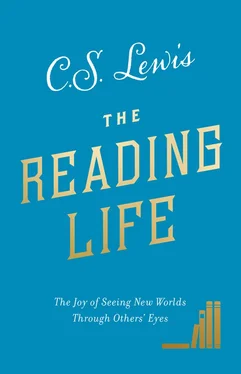1. Loves to re-read books.
The majority never read anything twice. The sure mark of an unliterary man is that he considers ‘I’ve read it already’ to be a conclusive argument against reading a work. We have all known women who remembered a novel so dimly that they had to stand for half an hour in the library skimming through it before they were certain they had once read it. But the moment they became certain, they rejected it immediately. It was for them dead, like a burnt-out match, an old railway ticket, or yesterday’s paper; they had already used it. Those who read great works, on the other hand, will read the same work ten, twenty or thirty times during the course of their life.
2. Highly values reading as an activity (versus as a last resort).
Secondly, the majority, though they are sometimes frequent readers, do not set much store by reading. They turn to it as a last resource. They abandon it with alacrity as soon as any alternative pastime turns up. It is kept for railway journeys, illnesses, odd moments of enforced solitude, or for the process called ‘reading oneself to sleep’. They sometimes combine it with desultory conversation; often, with listening to the radio. But literary people are always looking for leisure and silence in which to read and do so with their whole attention. When they are denied such attentive and undisturbed reading even for a few days they feel impoverished.
3. Lists the reading of particular books as a life-changing experience.
Thirdly, the first reading of some literary work is often, to the literary, an experience so momentous that only experiences of love, religion, or bereavement can furnish a standard of comparison. Their whole consciousness is changed. They have become what they were not before. But there is no sign of anything like this among the other sort of readers. When they have finished the story or the novel, nothing much, or nothing at all, seems to have happened to them.
4. Continuously reflects and recalls what one has read.
Finally, and as a natural result of their different behaviour in reading, what they have read is constantly and prominently present to the mind of the few, but not to that of the many. The former mouth over their favourite lines and stanzas in solitude. Scenes and characters from books provide them with a sort of iconography by which they interpret or sum up their own experience. They talk to one another about books, often and at length. The latter seldom think or talk of their reading.
It is pretty clear that the majority, if they spoke without passion and were fully articulate, would not accuse us of liking the wrong books, but of making such a fuss about any books at all. We treat as a main ingredient in our well-being something which to them is marginal. Hence to say simply that they like one thing and we another is to leave out nearly the whole of the facts. If like is the correct word for what they do to books, some other word must be found for what we do. Or, conversely, if we like our kind of book we must not say that they like any book. If the few have ‘good taste’, then we may have to say that no such thing as ‘bad taste’ exists: for the inclination which the many have to their sort of reading is not the same thing and, if the word were univocally used, would not be called taste at all …
Many people enjoy popular music in a way which is compatible with humming the tune, stamping in time, talking, and eating. And when the popular tune has once gone out of fashion they enjoy it no more. Those who enjoy Bach react quite differently. Some buy pictures because the walls ‘look so bare without them’; and after the pictures have been in the house for a week they become practically invisible to them. But there are a few who feed on a great picture for years. As regards nature, the majority ‘like a nice view as well as anyone’. They are not saying a word against it. But to make the landscapes a really important factor in, say, choosing the place for a holiday—to put them on a level with such serious considerations as a luxurious hotel, a good golf links, and a sunny climate—would seem to them affectation.
WHY CHILDREN’S STORIES ARE NOT JUST FOR CHILDREN
Of Other Worlds
(from “On Three Ways of Writing for Children”)
I AM ALMOST INCLINED TO SET IT UP AS A CANON THAT a children’s story which is enjoyed only by children is a bad children’s story. The good ones last. A waltz which you can like only when you are waltzing is a bad waltz.
This canon seems to me most obviously true of that particular type of children’s story which is dearest to my own taste, the fantasy or fairy tale. Now the modern critical world uses ‘adult’ as a term of approval. It is hostile to what it calls ‘nostalgia’ and contemptuous of what it calls ‘Peter Pantheism’. Hence a man who admits that dwarfs and giants and talking beasts and witches are still dear to him in his fifty-third year is now less likely to be praised for his perennial youth than scorned and pitied for arrested development. If I spend some little time defending myself against these charges, this is not so much because it matters greatly whether I am scorned and pitied as because the defence is germane to my whole view of the fairy tale and even of literature in general. My defence consists of three propositions.
(1) I reply with a tu quoque [“you also”]. Critics who treat adult as a term of approval, instead of as a merely descriptive term, cannot be adult themselves. To be concerned about being grown up, to admire the grown up because it is grown up, to blush at the suspicion of being childish; these things are the marks of childhood and adolescence. And in childhood and adolescence they are, in moderation, healthy symptoms. Young things ought to want to grow. But to carry on into middle life or even into early manhood this concern about being adult is a mark of really arrested development. When I was ten, I read fairy tales in secret and would have been ashamed if I had been found doing so. Now that I am fifty I read them openly. When I became a man I put away childish things, including the fear of childishness and the desire to be very grown up.
(2) The modern view seems to me to involve a false conception of growth. They accuse us of arrested development because we have not lost a taste we had in childhood. But surely arrested development consists not in refusing to lose old things but in failing to add new things? I now like hock, which I am sure I should not have liked as a child. But I still like lemon-squash. I call this growth or development because I have been enriched: where I formerly had only one pleasure, I now have two. But if I had to lose the taste for lemon-squash before I acquired the taste for hock, that would not be growth but simple change. I now enjoy Tolstoy and Jane Austen and Trollope as well as fairy tales and I call that growth: if I had had to lose the fairy tales in order to acquire the novelists, I would not say that I had grown but only that I had changed. A tree grows because it adds rings: a train doesn’t grow by leaving one station behind and puffing on to the next. In reality, the case is stronger and more complicated than this. I think my growth is just as apparent when I now read the fairy tales as when I read the novelists, for I now enjoy the fairy tales better than I did in childhood: being now able to put more in, of course I get more out. But I do not here stress that point. Even if it were merely a taste for grown-up literature added to an unchanged taste for children’s literature, addition would still be entitled to the name ‘growth’, and the process of merely dropping one parcel when you pick up another would not. It is, of course, true that the process of growing does, incidentally and unfortunately, involve some more losses. But that is not the essence of growth, certainly not what makes growth admirable or desirable. If it were, if to drop parcels and to leave stations behind were the essence and virtue of growth, why should we stop at the adult? Why should not senile be equally a term of approval? Why are we not to be congratulated on losing our teeth and hair? Some critics seem to confuse growth with the cost of growth and also to wish to make that cost far higher than, in nature, it need be.
Читать дальше












